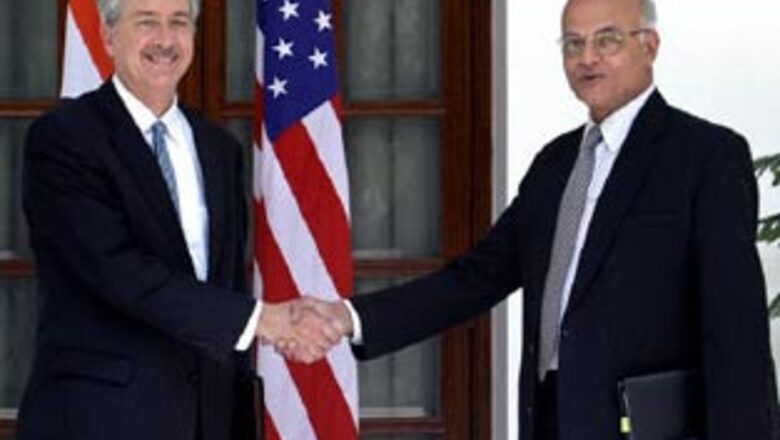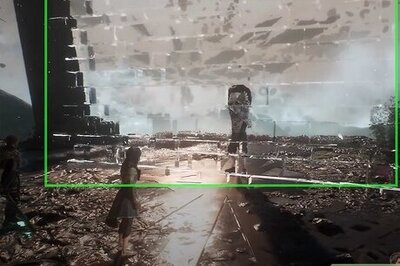
views
London: India and Pakistan may be edging towards reopening talks, but are unlikely to pick up where they left off in a peace process which Washington hopes will ease tensions across the region as far as Afghanistan.
Prime Minister Manmohan Singh said on Tuesday India was ready to meet Pakistan "more than half way", raising expectations of a resumption in talks broken off after last November's attack on Mumbai by Pakistani-based militants.
The first chance to break the ice would come if, as is likely, Singh attends a Shanghai Cooperation Organisation summit in Russia next week and meets President Asif Ali Zardari on the sidelines.
Both leaders, who have not met since Mumbai, could use this as "an opportunity to remove any misunderstandings and to pave the way for the resumption of the composite dialogue," said Wajid Shamsul Hasan, Pakistan's High Commissioner to London.
Washington is pushing for an easing of tensions between India and Pakistan so that Islamabad can focus on fighting Taliban militants on its western border with Afghanistan.
"We would support more dialogue between the two countries," US State Department spokesman Ian Kelly said on Tuesday as Under Secretary of State William Burns began a visit to India.
But expecting a breakthrough that might give Washington real breathing space in Afghanistan and Pakistan is a long shot.
Talking to people from both countries, positions appear to be further apart than they have been since at least 2003 before formal and informal talks led to what some say was a near breakthrough deal on Kashmir.
While India wants to focus on persuading Islamabad to take action against the Lashkar-e-Taiba militant group it blames for the Mumbai attack, Pakistan is looking for comprehensive talks, including on the festering Kashmir dispute.
"(Any) talks will be on the subject of Pakistan cooperating with India on Mumbai," said Indian strategic analyst B Raman.
"If America thinks we are going to start direct talks ... it's going to be very difficult." Pakistan wants all issues back on the table, including UN resolutions passed in 1948 giving Kashmiris the right to a plebiscite, which had been set aside by former President Pervez Musharraf in an effort to secure a peace deal with India.
"Musharraf went beyond his mandate. How can he set aside the UN?" said Hasan. "He went rather overboard in offering that to India. The Indians should have grabbed it, but they didn't."
BACK TO SCRATCH
According to Steve Coll, now president of the New America Foundation think-tank, India and Pakistan came near to a breakthrough on Kashmir in 2007 before Musharraf ran into political problems which eventually forced him to step down.
PAGE_BREAK
He said secret talks held in parallel to the formal dialogue produced a roadmap "non-paper" which would give Kashmiris some autonomy and, as long as violence declined, each side would gradually withdraw its troops from the region.
A joint mechanism, made up of local Kashmiri leaders, Indians and Pakistanis, would be set up to oversee issues that affected populations on both sides of the Line of Control -- the ceasefire line dividing the disputed region. Analysts vary on how close that agreement came to being signed -- Coll said it was a road map rather than a done deal. But it looks unlikely to be the starting point for any renewed dialogue between India and Pakistan.
"The non-paper as such could be there, but it is not something that we could take as a sacrosanct document," said Hasan, Pakistan's High Commissioner.
He said Pakistan and India should aim to build trust and confidence, including for example by demilitarising the high altitude Siachen region on the fringes of Kashmir.
As trust improved, they could try over a period of years to find a solution to Kashmir that left neither country feeling threatened, and that considered the wishes of the Kashmiris.
"Kashmir can't be resolved overnight, so one need not go to war over it," he said. But in contrast to that lengthy trust-building process, India is looking for rapid action from Pakistan to crack down on those it blames for the Mumbai attacks. It was incensed when a Pakistan court last week ordered the release from house arrest of Hafiz Mohammad Saeed, the founder of the Lashkar-e-Taiba.
"The refrain here is that nothing will be achieved by once again resuming dialogue with a government that is both unable and unwilling to act decisively against terrorists operating from its soil," said Gurmeet Kanwal, head of the Centre for Land Warfare Studies in New Delhi.
"As for Siachen, attitudes have hardened. The government will be seen to be buckling under US pressure if it even considers discussing demilitarisation. Hence, this too is a non-starter at present," he said.
Complicating matters are Indian doubts about whether Zardari's civilian government has enough backing in the country -- including from opposition leader Nawaz Sharif and the powerful military -- to negotiate effectively.
In contrast, after winning re-election last month, Singh is in a strong position to manage ties with Pakistan and to call the shots if he sees the opportunity for a limited opening.
In any case, according to Coll, Singh's Congress party made a point of briefing the opposition Bharatiya Janata Party on its earlier talks with Pakistan to maintain cross-party consensus. Singh's office said he was "most likely" to attend the summit of the Shanghai Cooperation Organisation -- which groups Russia, China and Central Asian states, and in which India has observer status, but declined further comment.




















Comments
0 comment